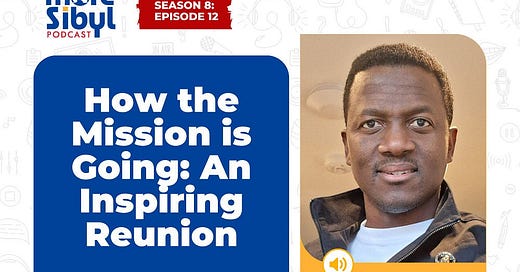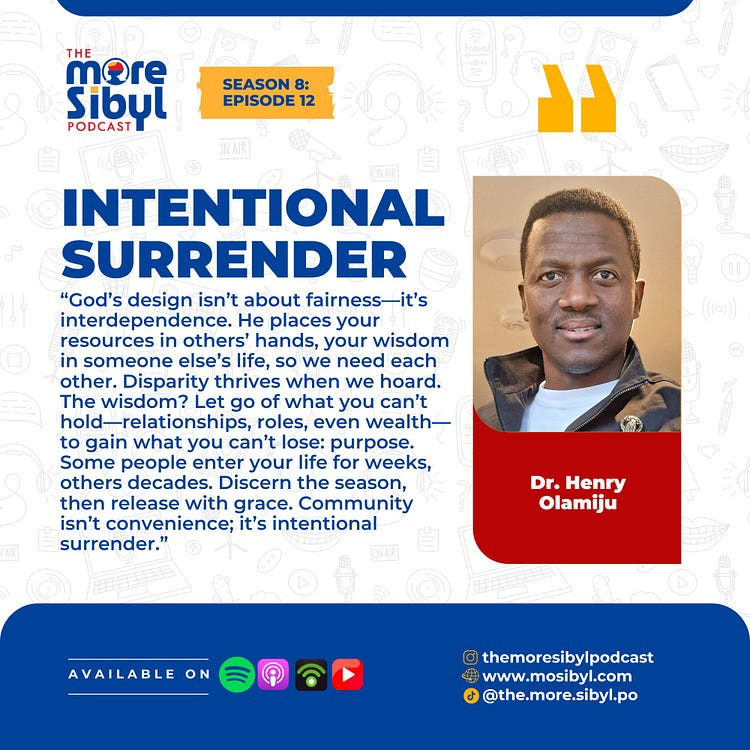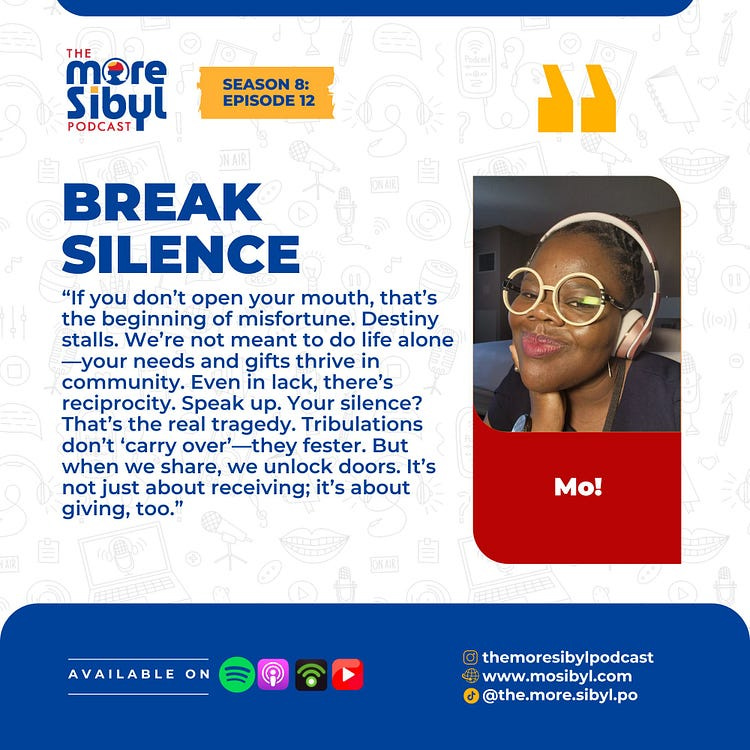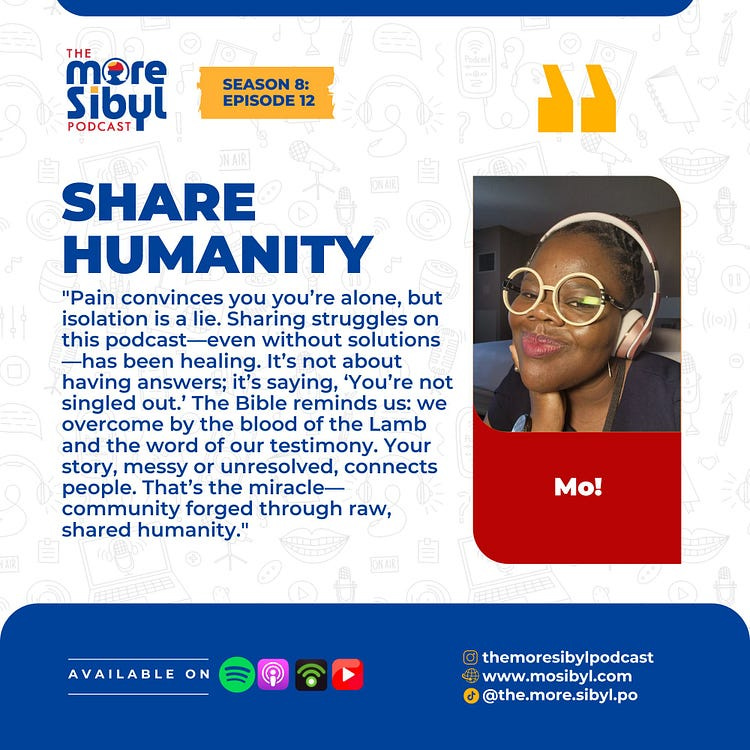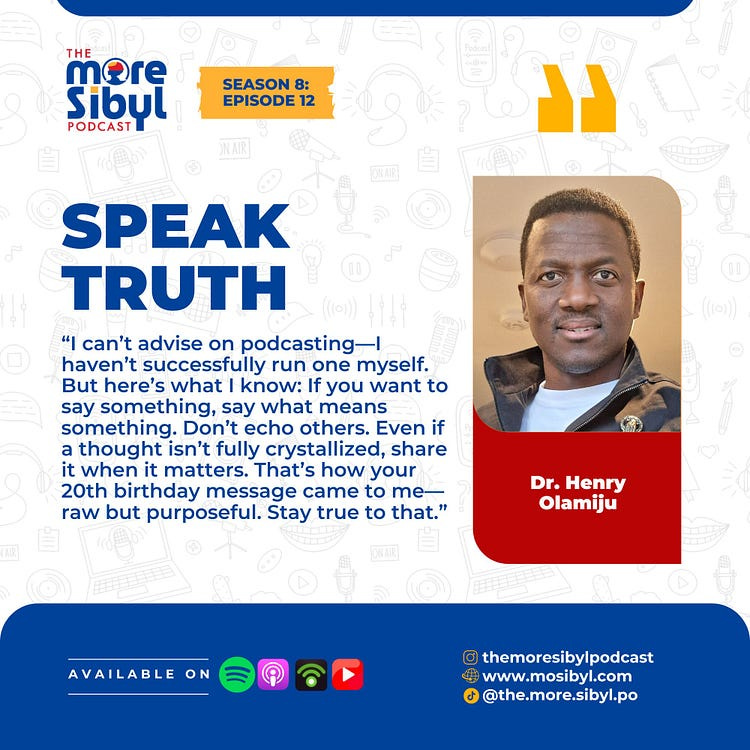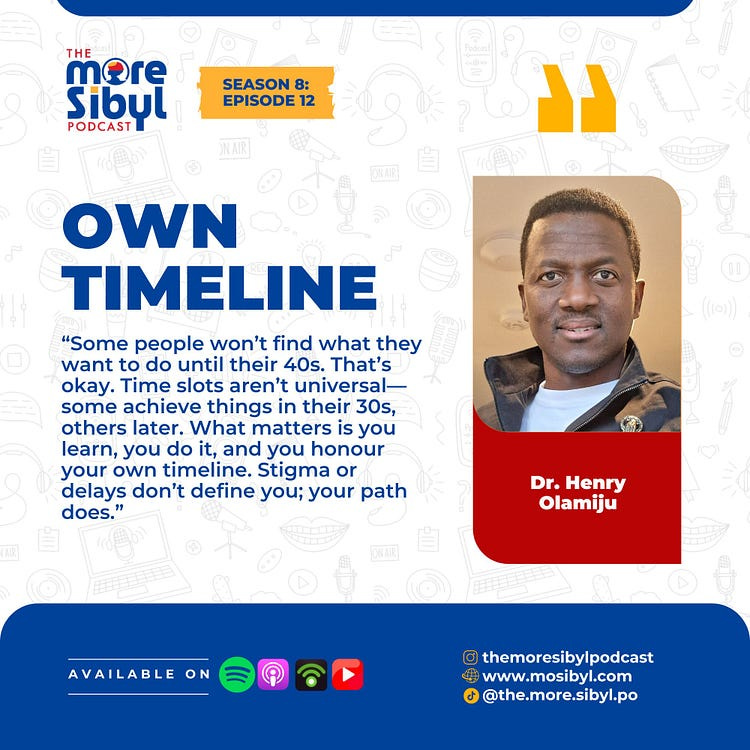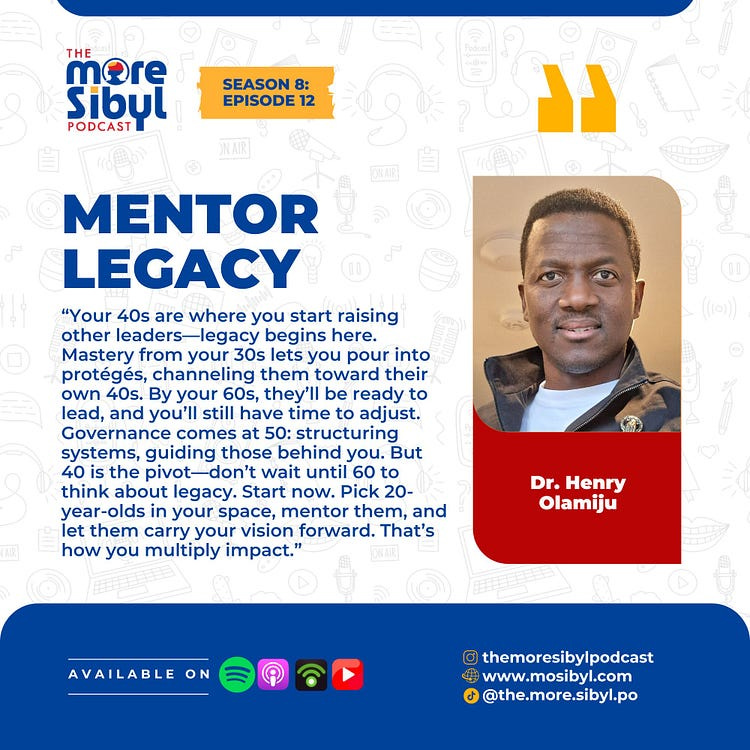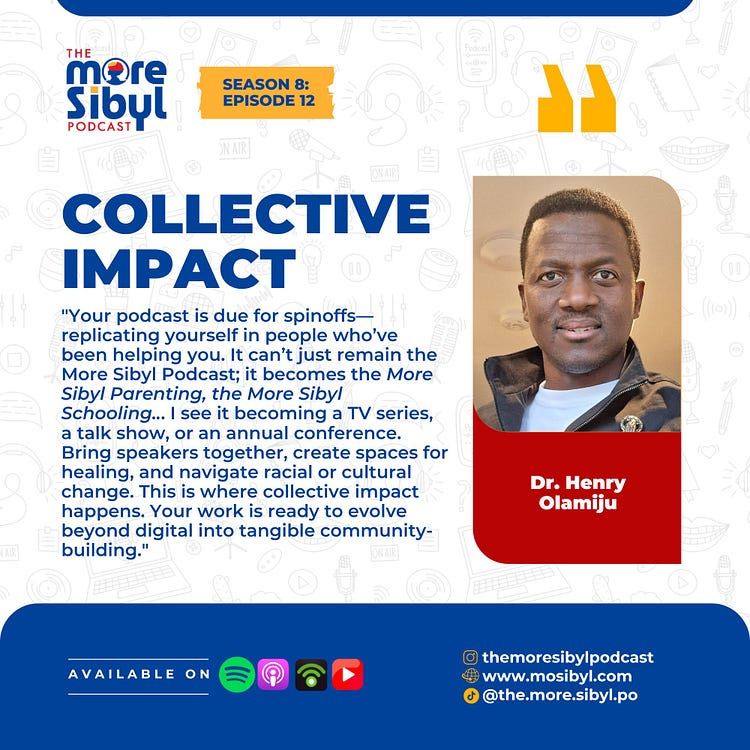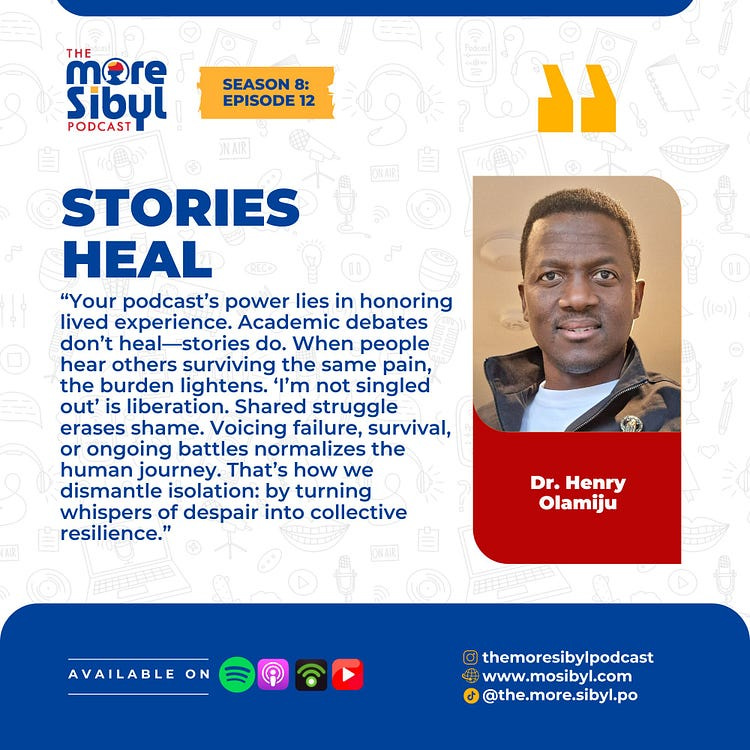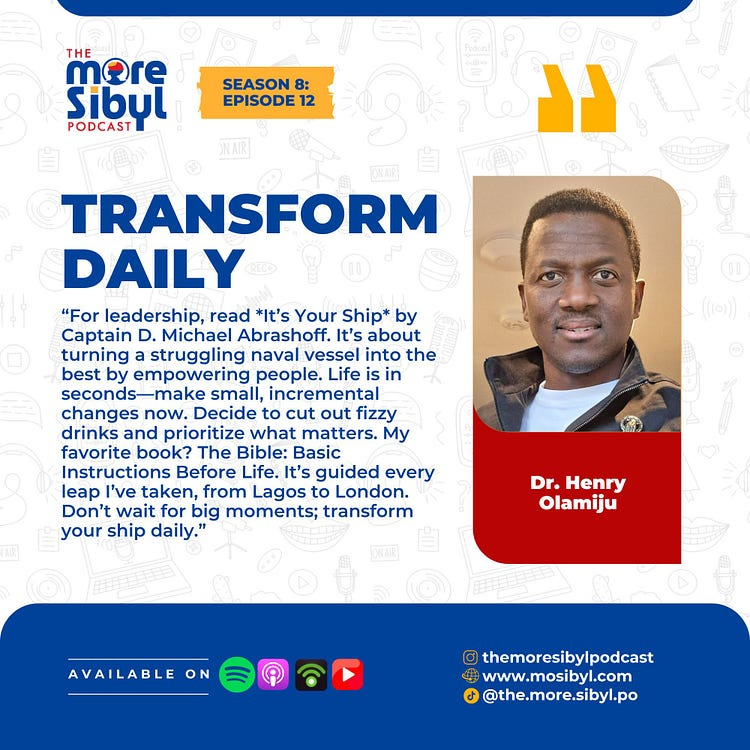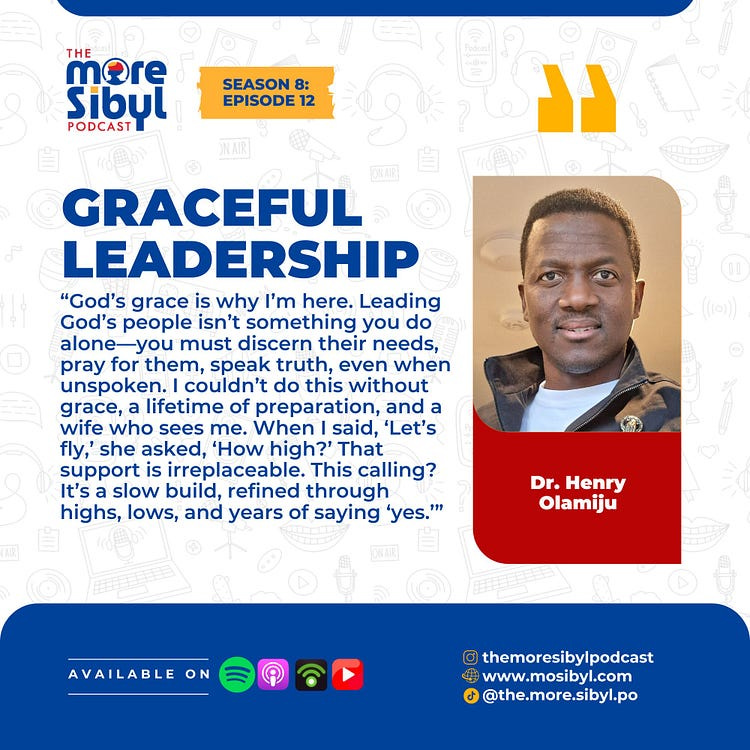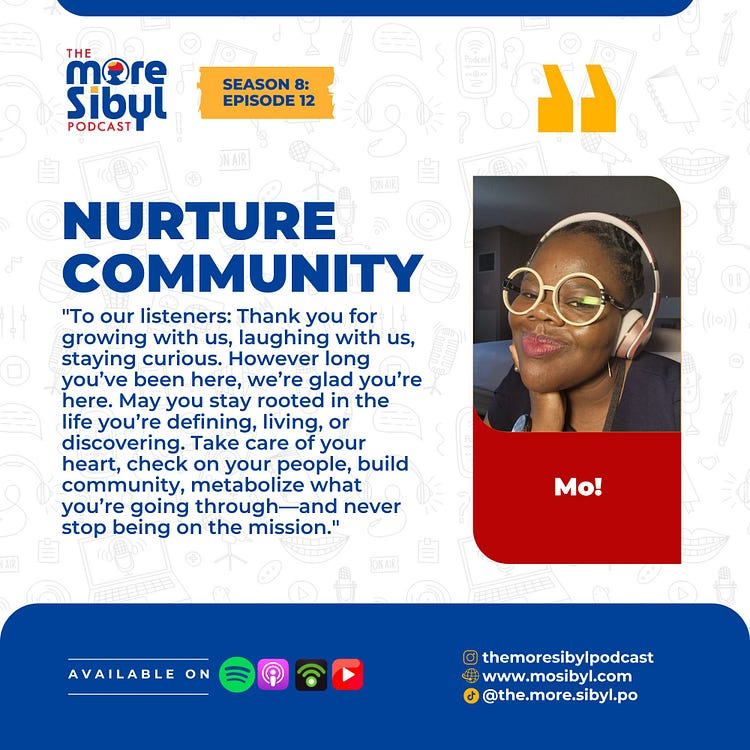How the Mission is Going
빛 속에서| An Inspiring Reunion with Doctor, Pastor Henry Olamiju | Episode 12 (2025)
“Your 40s are where you start raising other leaders—legacy begins here. Mastery from your 30s lets you pour into protégés, channeling them toward their own 40s. By your 60s, they’ll be ready to lead, and you’ll still have time to adjust. Governance comes at 50: structuring systems, guiding those behind you. But 40 is the pivot—don’t wait until 60 to think about legacy. Start now. Pick 20-year-olds in your space, mentor them, and let them carry your vision forward. That’s how you multiply impact.” — Dr. Olamiju (2025)
It’s another special reunion episode as we celebrate seven incredible years of our podcast family! Quick disclaimer to all our Mosiblings out there — remember that one friend you were constantly compared to because they seemed to excel at everything? Well, meet the ultimate overachiever: Doctor, Pastor, Photographer — yes, all three — Henry Olamiju. Trust me, he’d outshine all those childhood benchmarks without even trying. I couldn’t wait to dive into how he manages to juggle so many roles.
Dr. Henry lives by a powerful mantra: “Life is about experiences.” And true to his word, he’s on a mission to live fully, deeply, and wide. His first appearance on the show back in 2022 was perfectly titled “Man on a Mission,” and that mission? It’s still going strong.
From hilarious childhood stories (yes, there was a taxi incident) to building faith communities in the UK, his episode was full of wisdom and belly laughs that had us laughing so hard we fell off our chairs (so go listen to it!). Now, years (and a pandemic) later, we’re checking in with our dear friend to see how life, ministry, and the mission have evolved. Henry is a physician, a minister, a proud Lagos boy, and hands down one of the most thoughtful voices we’ve had on the show. So buckle up — this will be a heart-stirring, refreshing, and side-eye-sparkling ride.
Living in the Light of Community
Right off the bat, Henry shares amazing insights on living in community and how opening up about struggles is one of the best things you can practice. He told me that our first podcast episode created space for him to articulate things he’d never said out loud before — thoughts that had just been sitting quietly at the back of his mind. Simply saying them out loud, he said, was liberating. It reminded him how important it is to be honest about what you’re going through, because the moment you speak it, it begins to lose its grip.
He shared a simple but striking example from church: he needed help getting a document. So, during a meeting, he simply stated it. “If you need this, I’m looking for this,” he said. Instantly, someone responded with a solution and a contact. Just like that, the problem was solved. All because he said it out loud.
Then he told the story of Ms. Ibukun Awosika’s time at Harvard. She was in a room with about 50 global CEOs during a short course. On the final day, a professor asked if anyone had dreams or desires they’d given up on — things they once wanted but believed were now out of reach. Almost every hand went up. These were people who appeared to have it all, yet deep down, they still harbored unspoken hopes.
But here’s the twist: after everyone shared, the professor asked if anyone could help bring someone else’s dream to life. By the time they were done, 48 out of the 50 had someone who could help. Just by speaking up. This story reminded me of the Yoruba proverb, which essentially states, “Not being able to open your mouth is the beginning of misfortune in your life.” Bring your struggles to the light!
That story led us to reflect on the kind of community we’re meant to live in — not one of isolation, but one of exchange. As Henry put it, God often places your solution in someone else’s hands, and theirs in yours, so that we are propelled to live as a community. You have to be willing to connect. He said, “Find out who you are made for, who you are supposed to speak to.” Some connections are for a lifetime. Others might be for three weeks or six months. But all of them matter. Then he dropped a line I’m still chewing on: “Have the wisdom to let go of what you cannot hold, to gain what you cannot lose.”
And that idea of sharing—of speaking out—is exactly what I found myself living through recently. As a mom, navigating the shift from private to public school for my daughter was eye-opening. We live in a predominantly white neighborhood, and though I always try to lead with the belief in people’s good intentions, there are moments when I have to advocate for her, to gently call attention to things that, while perhaps not ill-intended, can come across with a particular bias.
I realized that simply having the words — and the time — to speak up is a privilege. Not every parent has that. Some can’t afford to take time off work. Others might not feel equipped to challenge the system. So I created a panel for parents like us, especially those from the diaspora, who are interfacing with the school system for the first time. A space where we can learn how to advocate, support our children, and collaborate with teachers and principals in a way that’s constructive, not combative. It’s not about “us vs. them.” It’s about helping them help us.
And it’s wild because, as my husband reminded me, so much of what I’m doing now has grown directly from the podcast. The painful parts of my story, the struggles I’ve been brave enough to talk through on the mic — they’ve all become seeds for community. I may not have had all the answers, but in sharing, I’ve found healing. I’ve found people who say, “Me too.” And together, we’ve created space for others to find the courage to speak up.
Henry affirmed that beautifully. He said the strength of this podcast is how we center real, lived experiences — not just academic theories or abstract thought. People often feel like they’re the only ones going through something hard, as if life has singled them out for pain. But when they hear others who have made it through — or are still walking through — they realize they’re not alone. And even those who’ve “failed” but keep showing up? They’re part of that healing, too.
Henry put it best: speaking about what you’re going through is liberating. It lifts the weight. And as we both agreed, even scripture reminds us that we overcome not just by faith, but by the words of our testimonies (Revelation 12:11). Sharing isn’t just helpful — it’s powerful.
Grace for the Many Hats
Without wasting any time, my next question hit the nail on the head: “How do you juggle all your roles — pastor, doctor, writer, photographer, husband, father?” He started by saying, “The person who sends you on an errand gives you the capacity to carry it out.” That alone could preach. For him, that “person” is God, and grace has been his biggest strength.
Of course, Henry never expected the path he eventually took. In fact, initially, he was reluctant to take on the role of pastoring The Covenant Nation London. At the time, he was already deeply involved with the global diaspora arm of his church, even serving as the Vice President for Europe. When they asked him to step up and take full leadership, he declined. He had exams pending, a growing family, and way too much on his plate. He couldn’t even commit to a couple of Zoom calls a week. And yet, just a month later, his pastor told him, “We’re starting a church in London — and you’re going to lead it.”
The irony? That same man, who couldn’t attend two Zoom meetings a week, was now participating in five meetings every week — strategy sessions, daily prayer, and two-to-three-hour Saturday calls. And this went on for months before the church even launched.
Henry doesn’t even live in London — he commutes two and a half hours each way on Sundays. All of this on top of his day job, exams, family life, and more. And yet, he’s still standing. He credits it all to grace, and also to the fact that this wasn’t a sudden detour — it was a long time coming. He’s been known as “Pastor Harry (PH)” since his university days. He even joked about his old email handle: The Reverend Father, later upgraded to The Reverend Doctor. It’s been in him for years.
And then, there’s his wife. Henry made it clear that her unwavering support is a cornerstone of his ability to say yes to all of this. When he came home and told her he’d been asked to pastor a new church, she didn’t flinch. Her response? “Okay. Let’s go for it.” That kind of partnership — the kind that says, “If we’re jumping, how high?” — is a gift.
So, while it may appear that he’s wearing too many hats, the truth is that they all seem to fit. Grace, a long preparation, and a partner who sees and supports the whole picture — those are Henry’s secret weapons.
Nothing Is Wasted
Picking up from where Henry left off about grace and preparation, we naturally slipped into one of those “wow, life comes full circle” moments. The older I get, the more I’m convinced that nothing is coincidental. The skills we pick up — often in what feel like random seasons — end up converging in unexpected but perfect ways. And Henry agreed wholeheartedly.
He brought up the parable of the talents and how easy it is to overlook what you’ve been given, especially in today’s world of social media comparison. It’s like everyone’s chasing what’s loud and obvious — music, art, celebrity-level creativity — while forgetting that simple, foundational skills can be just as powerful.
Coming back to the importance of community, Henry said something that stuck with me: people often don’t realize what they’re good at until they’re part of a community. For him, being in groups helped reveal that he’s not the finance guy — you won’t catch him tracking expenses or managing spreadsheets. But what he did find is that he could talk. And not just talk — he could lead, encourage, and connect with others. He naturally gravitated toward checking in on people, showing up for others. Back in school, he visited nearly everyone in his class personally, just because it was in him.
That simple act — putting yourself out there — has echoed through his life. He said something that made me stop and think: “Let’s say you were born 800 years ago, with no science, no tech, no organized medicine — are you telling me you wouldn’t have something to do?” That hit hard. Because it reminds us that our value isn’t tied to modern systems or degrees — God has equipped us with gifts long before our careers ever had names.
And then he shared how writing began for him — apparently, it was an “accident.” After reading a poem his friend wrote, he wanted to try it out for himself. It wasn’t a masterpiece, but it was something. Some time passed, and a catastrophic event landed him in a remote village, and in that solitude, he started writing. First, messages. Then, thoughts. Then full pages. He would look at his environment, imagine a story, and then write. That’s how it started, not on a stage, but in stillness.
Henry’s life is a testament to the fact that every experience counts. The unnoticed skills, the quiet hobbies, the habits formed in seemingly unremarkable seasons — they’re all preparing us for something. You have to stay present enough to recognize them and faithful enough to use them.
Healing Unlocks Progress
One thing I’ve come to realize through this podcast is that progress often starts in the places we’d rather avoid. When I started this podcast seven years ago, I had to come clean with myself. I had a broken relationship with my dad. For a long time, I carried hate that eventually turned into indifference. It wasn’t until I faced that wound, wrote a letter, stood my ground despite the fallout, and finally started talking to him, that something in me cracked open. Something freeing and creative. This experience is foundational to this podcast.
That unforgiveness is something that holds you back. You think it’s harming the person, but in truth, “it’s like drinking poison and expecting another person to die.” I took the opportunity to ask Henry for his advice on how people who are currently where I was back then — holding wounds in their hearts — can move forward from the pain.
He said something that hit me: out of our hurts and pains come the glories of our lives. And for you to be able to get that glory, you have to let go of the hurt, and healing does not come until you expose it. That idea resonated deeply. He discussed his own experience with procrastination — how he used to dismiss it, not realizing it was tied to deeper issues. But when he finally brought it into the open, something shifted. He found the strength to build structure into his life, to show up for the things that mattered. And it all started with a conversation — just saying it out loud.
He used this powerful metaphor, I won’t forget — about stepping on a rusty nail as a child. The outer wound closed, but inside, where no air could reach, things began to fester. That’s what happens when we bury hurt. On the outside, we look fine — maybe it’s been years since the event — but inside, something’s fermenting. Until we bring it to light, it just sits there, poisoning us quietly.
We’re not saying you need to pour your heart out to the world. But finding a safe place — a therapist, a trusted friend, even the person who hurt you — can be the first step. It’s not about minimizing your pain. It’s about metabolizing it, processing it, and giving it oxygen so that healing can begin.
Henry said it best: it’s not worth keeping it in. There are so many justifiable reasons to hold on, but the cost is too high. Letting the light in — even a little — can create space for progress, creativity, and peace.
Staying Grounded Through Intentional Rhythm
When I asked Henry what spiritual disciplines were keeping him grounded these days, here’s what he shared. First, he belongs to the special class of people (like me!) who are more productive when life is whole and busy. He shared that the less he had on his plate, the more he found himself slipping into laziness, depression, or just a general lack of motivation. However, when there is structure, responsibility, and movement, he thrives. This was extremely relatable. We don’t have a special name yet, but if you also feel this way, let’s have a meet and greet in the comment section! It’s almost like that rhythm creates a kind of alignment, allowing him to operate at his best.
One of the ways he’s sustaining that rhythm right now is through consistent prayer and fasting. As the head of the intercessory team for an upcoming church conference in July, Henry is not just coordinating things from the sidelines — he’s diving in himself. He is actively praying every day, and that is fueling his inner life in powerful ways. That intentional time has become a space where he feels spiritually charged and more attentive to the subtle nudges and insights that come even during mundane tasks, such as washing or spreading clothes.
It’s not just prayer, though. He stays informed by listening to podcasts, sermons, and even bite-sized 60-second videos from pastors or teachers on Instagram. And I loved that he mentioned being eclectic with it — he doesn’t just learn from pastors! This podcast is proof that wisdom isn’t exclusive to any one person or platform. If someone’s been through something and carries insight, Henry’s open to learning from them — and so are we. That posture of humility, of listening and meditating on even the smallest truth, is a big part of what keeps him grounded.
I think there’s something powerful in that simple, quiet discipline: stay in rhythm, stay connected, stay listening.
Leading Across Continents Without Losing Connection
When I asked Henry how he maintains unity and shared purpose across continents — leading a church in London while staying connected to its Lagos headquarters — his honesty about the challenges stood out. He didn’t want to transplant the Lagos model into London. The cultural contexts are just too different. In London, for example, people don’t worry about things like electricity and transport the way Lagosians do. So Henry knew from the start: adaptation was essential.
He made intentional changes. Things like the music, the structure, even service punctuality — he insisted that if church starts at 10, then 10 is 10. That kind of cultural sensitivity was evident in every detail, right down to how the church addressed local expectations. Londoners have access to credit facilities, for instance, so the messaging around financial needs had to shift. Henry didn’t make those decisions alone either. He sat down with his team, asked genuine questions about their challenges, and sought God's direction.
And what he received wasn’t just about logistics — it was theological, too. He shared that it’s about anchoring everything in God’s original intent: inheriting the promises made to Abraham through Christ. That became the foundation for shaping messages, staying spiritually aligned, and ensuring the church remains relevant in different contexts.
What struck me most was the way Henry holds both independence and connection with such grace. His senior pastor back in Lagos gives him room to lead — but stays available, checks in, and offers wisdom. One piece of advice that changed Henry’s approach was not to bend over backwards to appeal to a different demographic right away. His pastor reminded him that even Jesus started with the house of Israel — those who could understand the message — before expanding outward to the Gentiles.
He wrapped it all up beautifully with the story of Elijah and Elisha. It’s a picture of spiritual continuity — vision passed down through close, undistracted mentorship. “If you can see as I see,” Henry quoted, “a double portion of what I’m doing, you will get.” That kind of alignment — spiritually and practically — is what keeps the vision alive and growing across continents.
What Each Decade Demands: Defining, Doing, and Devolving
There’s a line Henry said to me nearly 20 years ago on my 20th birthday that I’ve never forgotten. He told me, “20 is when you define the life you want. 30 is when you begin to live the life you defined.” That one insight has followed me ever since, shaping how I approached my work, community, and purpose in those formative years. But now that I’m edging closer to 40, I had to ask him: what comes next?
He broke it down in a way that felt equal parts sobering and inspiring. In your 20s, he said, you should be trying things out — stepping beyond the classroom into real life. Don’t wait till you’re done with school to start living. Be part of a community, get involved, and stretch yourself. And don’t be under pressure to settle and become a master at something — that’s what your future years are for. Your 30s, then, are about picking something and doing it. That’s where the grind begins, the place where you sit down and dig deep into your chosen field.
But it’s the 40s that reframed things for me. According to Henry, that’s when you enter a phase of mastery. It’s the decade where you stop thinking only about personal growth and begin building a legacy, specifically by raising others. You start mentoring, pouring your knowledge and experience into the next generation. He’s already doing it, intentionally connecting with 20-year-olds in his church, guiding them, and sowing into their futures. As he put it, if you wait until your 60s to begin thinking about legacy, you’ve lost the chance to make meaningful adjustments along the way.
And then comes the 50s, which Henry sees as a time of governance. That’s when God gives you a new vision, built on everything you’ve done so far. It’s the peak of your influence — the era when you help structure and support others across different spaces and industries. You’re no longer just in the room; you’re a captain among peers.
What moved me most was hearing how that original thought he shared on my birthday didn’t come from a script. It was a reflection that had been simmering in him, and that moment just happened to crystallize it. And now, years later, it’s not just a line he gave me — it’s become part of the blueprint for his own life, mine, and now, hopefully yours.
From Podcast to Platform: Embracing What’s Next
As we mark the podcast’s seventh anniversary, I asked Henry a question that’s been on my mind: what comes next? What should year eight look like — not just for the show, but for the community around it?
Henry’s answer came with that signature clarity and calm challenge he always brings. He said it might be time to evolve — time to take what we’ve built and bring it into the real world. Not just keeping it in our ears, but making it tangible. He suggested hosting an in-person conference, even if just once a year. A space where we gather the voices we’ve amplified, create interest groups — on healing, on navigating cultural or racial change — and bring the conversations to life.
He spoke about spin-offs, too. That this podcast has reached a point where it’s ready to replicate itself — not just with more episodes, but by multiplying through people and platforms. Maybe even a talk show. A series. A bigger, bolder expression of what we’ve started here.
It was a lot to take in — and I told him as much. But scary doesn’t mean bad. Scary can mean stretching. And this is coming from someone who’s seen the long arc of this work from the very beginning, so I’m holding it with the weight it deserves. No pressure… but I’m already dreaming.
Small Shifts, Big Life
As we wrapped up the episode, I asked Henry if he had any book or media recommendations for those of us who are constantly looking for ways to grow and build ourselves. True to form, he didn’t disappoint. First up, a leadership book: It’s Your Ship by Captain D. Michael Abrashoff. It tells the story of how a struggling naval ship became one of the best through small, intentional changes — building people, listening deeply, and fostering a sense of belonging. Henry emphasized that life works the same way. It’s not always about the dramatic shifts. Often, it’s about the seconds — the tiny pivots like his decision one day to stop drinking fizzy drinks — not earth-shattering, but one small choice that’s lasted for years.
Next, he mentioned his favorite book, “The Bible.” Every idea, every pivot in his life — whether it was moving from Lagos to London, becoming a pastor, or even receiving a scholarship — he found confirmation and clarity through scripture. That consistency, that grounding, really came through in everything he shared.
And his parting wisdom? Life isn’t about comparing timelines. Some people bloom in their 30s, others in their 40s, and some even later. And that’s okay. As Henry put it, “The covenant pathway to destiny is a lonely path,” and we each arrive at our own time. The fish that swims isn’t better than the monkey that climbs. We’re differently abled. Beautifully, purposefully different.
This conversation reminded me of what my friend Ayomide once said: “You can only find yourself in community.” That’s what this podcast has always been about: growing, learning, becoming together.
So as we close this seven-year chapter, here’s my invitation to you: Keep building your life in small ways. Keep showing up for your people. Keep discovering who you are — especially in the in-between. And don’t forget to check in on your own heart, too.
Until next time, Mosiblings! Stay rooted, stay growing, and stay on mission.
🅻🅸🅽🅺🆂:
Listen: Listen: https://mosibyl.podbean.com/e/phenry2025/
Download: https://mcdn.podbean.com/mf/web/7uxpqxhfrbywi62s/PHENRY2025.mp3
Or on the website: www.mosibyl.com
Henry’s First Episode: https://mosibyl.podbean.com/e/henryo2022/

